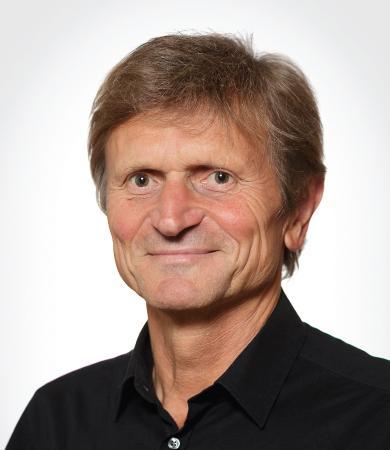APS Spotlight
Perspectives Editor Klaus Fiedler to Spotlight Pluralism, Theory, “Best Practice” Examplars
APS Fellow Fiedler is APS's first journal editor in chief based at an institution outside North America.

On January 1, APS Fellow Klaus Fiedler began his tenure as the editor of Perspectives on Psychological Science. Fiedler is a professor of social psychology at the University of Heidelberg and will be APS’s first journal editor in chief based at an institution outside North America. Having studied a variety of topics, from language and cognition to computer-simulation models, he brings a broad body of research and knowledge as well as significant editorial experience to the journal. APS Publications Director Amy Drew recently asked Fielder a few questions about his vision for Perspectives.

What goals do you have for Perspectives under your editorship?
Fiedler: My most prominent, superordinate goal is to use Perspectives as an instrument to foster the quality of psychological science.
To more vividly express the spirit of my answer to this question, I might say that:
- Perspectives is a key journal for the ongoing discourse of how to improve the quality of behavioral science.
- It highlights a major developmental task of a discipline that is flourishing at the empirical level, whereas the theoretical underpinnings are lagging behind.
- It is extremely important to enrich merely statistical and numerical methods with more superordinate perspectives on methodology, including philosophy of science.
- As a rule, I believe that statistical methods are subordinate to research design, which is subordinate to logic of science. In other words, even the most sophisticated statistical methods are worth nothing if the research design is flawed. Likewise, even the most elaborate or compact research design is useless if the theory guiding an investigation is ill-defined, imprecise, or insensitive to prior knowledge.
I hasten to add, however, that psychological science is inherently pluralistic. It always allows for different standpoints, and I promise to make pluralism a guiding principle for Perspectives.
While I do not want to conjure up a rivalry of mutually dependent layers of methodology, I am overaccentuating here what I diagnose as a major obstacle for the current growth of science. One main motive of the role I have been playing in recent years is indeed helping to improve the quality of psychological science, not just in research but also in teaching, applied work, and communicating scientific results to the public.
In my view, Perspectives affords a key instrument to unfold this motive. I am deeply convinced that an effective strategy is to give more weight to the best exemplars of excellent research, of which we can be proud and which we want to imitate and to elaborate on in future research, rather than complaining about malpractices and embarrassing examples of bad research, which do not deserve to fill our major journals.
Related to this conviction, I propose that really compelling, groundbreaking findings are rare. From the scarceness of outstanding work, it follows that a reasonable cost-benefit analysis will reveal that false negatives can be much more costly than false positives. The latter can be corrected for, whereas the former are hardly recognized and therefore unlikely to be corrected. Thus, elaborating on the best exemplars of psychological science is more prominent and more constructive a goal of a leading journal like Perspectives than expressing complaints and lamenting negative examples.
Are there any topics or subject areas you would like to highlight more in Perspectives?
Fiedler: Honestly, I am perfectly happy with self-organizing forces determining the journal’s contents. It is most important, I think, that the journal highlight the strongest ongoing research programs, scientific debates, and academic activities in an authentic fashion. Highlighting what I personally consider cute topics is not important.
However, beyond articles from diverse subject areas speaking to basic, translational, and applied research and transcending the boundaries of specific subdisciplines, an asset of Perspectives that we might exploit more is the possibility to invite contributions of activist research. Here I am not only talking about special issues or special-issue sections convened by guest editors in their domains of expertise. I also intend to, and I have already started to, encourage leading scientists and outstanding junior scientists to document multilab collaborations, adversarial debates, model tournaments, and meta-science debates, to list but a few examples of what I call activist research.
Written with the help of my editorial team—which will include Mirta Galesic (Santa Fe Institute), Leonel Garcia-Marques (University of Lisbon), Tina Lowrey (HEC Paris), Tim Pleskac (University of Kansas), Aparna Labroo (Northwestern University), and Richard Morey (Cardiff University) as associate editors—my first editorial will not make a distinct attempt to make Perspectives a different journal. Why should we not stick to the many assets of a successful journal? However, our editorial will make a deliberate attempt to clarify what submissions the Perspectives team wants to attract and what submissions should be submitted elsewhere, if only to reduce the rate of frustrating desk rejections that reflect plain misunderstandings.
How has your previous editorial and research experience prepared you for the job of editing a journal as broad and unique as Perspectives?
Fiedler: Independent of my former editorial work, I like to be involved in a general journal with a broad readership. Since my time as a student, I have found it challenging and illuminating to approach behavioral-science questions from varying perspectives, and I believe my broad spectrum of interests is reflected in my publication list.
However, I learned many useful lessons during my previous editorial work for general outlets (Journal of Experimental Psychology: General; Psychological Review) as well as for more specialized journals with a restricted domain (Journal of Personality and Social Psychology; Journal of Experimental Social Psychology; European Journal of Social Psychology). Drawing on almost 20 years of editorial experience and on numerous editorial-board memberships, I recently coauthored, with Christian Unkelbach, a chapter on how to perform a good peer review for an Oxford University Press handbook. Feedback is welcome; maybe the idea can be developed further.
The editorial process relies on peer reviewers doing an honorable and highly responsible job. The very experience of changing perspectives—entailing the ability to consider pieces of scientific work from authors’, reviewers’, editors’, and readers’ perspectives—is the key to overcoming a narrow-minded, egocentric view of the peer-review process. Although recognizing the unselfish, constructive, purely scientifically motivated review process takes time, I believe that a good editor can contribute a lot to facilitating it.
What are your plans to ensure diverse representation—among authors and the editorial board—across demographic and geographic categories and content domains, as well as among underrepresented or marginalized groups?
Fiedler: This is indeed a challenging question, but the diversity topic is also charged with optimism and positive connotations. I really believe that, in the long run, the critical mass of research and the amplitude of the best exemplars will increase when a journal like Perspectives moves from an elitist outlet for a small subset of culturally homogenous scientists to a melting pot of diverse people representing different cultures, ethnic origins, and racial backgrounds.
Frankly speaking, the benefits of enhanced diversity may not be visible at once. As a former executive committee member of the European Association of Social Psychology, which was a pioneer among politically engaged scientific associations, I can only assure that it was worthwhile investing work, effort, and affirmative action into the development of disadvantaged countries. The benefit was not visible at the beginning. However, this transitory state was overcome soon, and leading young scientists (including exchange students) from underprivileged countries excelled in their motivation and qualifications. They soon enriched research and discourse in a refreshing way. Nowadays, many impressive examples of excellent psychological science in Europe originate in such formerly disadvantaged countries as Portugal, Italy, Poland, Croatia, Hungary, Turkey, and the Czech Republic (needless to say that this is just an ad hoc sample).
Note that diversity is not just an enlarged reference set. As in biological evolution, it amounts to a richer variety of mutations, gene recombination, and creative compounds that provide fertile ground for evolutionary progress.
Note also that appointing an editor from outside the United States (like me) is already a sizable step to enhance the diversity of authors and editors. I can assure you that the network of reviewers and advisors I have built up during the last two decades includes scientists from various cultures. Yet the circle of major players could be certainly enlarged just by open-minded diversity initiatives of the world’s major science organizations.
In the end, I do not believe that diversity can be enhanced in a bottom-up fashion, just by circulating emails, social media messages, or blogs. I rather believe that active steps will be necessary. Concretely, this may take different forms. In addition to announcing relevant special issues and inviting contributions from underprivileged countries and subcultures, I particularly believe that lecturers and copy editors might help researchers from different cultures to optimize the quality of their papers before they are published.
In my comments on diversity, I am alluding not just to skin color, ethnic origins, and social orientations but also to the pluralism of science and openness to nonmainstream research, in the spirit of Hannah Arendt’s challenge to overcome conformity and obedience.
What do you want prospective authors to consider when thinking about submitting to the journal and preparing their manuscripts?
Fiedler: Two things come to mind. First, I would like to emphasize once more that I hope Perspectives will be a forum for positive messages focusing on the best exemplars of compelling research rather than negative messages complaining about embarrassing exemplars of weak research. Of course, if authors have good reasons to submit papers that convey skeptical arguments, I will handle their submissions fairly.
Second, I would like prospective authors to beware of the trade-off between two criteria that a high-quality journal must meet simultaneously: It must oblige authors to the highest possible level of scientific scrutiny, and it must, at the same time, embrace pluralism and open-mindedness with regard to research topics, subdisciplinary rules, methodology, and affiliation with theoretical schools or vocational fields. If I may quote from our editorial:
…perhaps the most important, superordinate principle of good science is pluralism and openness for an up-front deliberation of all viable standpoints… However, … pluralism is not a synonym for leniency, laissez-faire, or “everything goes.” For pluralism to help [Perspectives] foster the quality of science, it must be understood as a commonly shared obligation to substantiate and explain all diverse standpoints at the same high level of scrutiny.
Prospective authors should keep this trade-off in mind. Although there can be no doubt that Perspectives is a highly selective journal with a demanding entry threshold, it intends to be open to unorthodox, unfamiliar, and nonmainstream research of all provenances. Suffice it to say that pluralism is also open to the old fundamental issues that have been of interest since the beginning of scientific psychology more than 100 years ago.





APS regularly opens certain online articles for discussion on our website. Effective February 2021, you must be a logged-in APS member to post comments. By posting a comment, you agree to our Community Guidelines and the display of your profile information, including your name and affiliation. Any opinions, findings, conclusions, or recommendations present in article comments are those of the writers and do not necessarily reflect the views of APS or the article’s author. For more information, please see our Community Guidelines.
Please login with your APS account to comment.